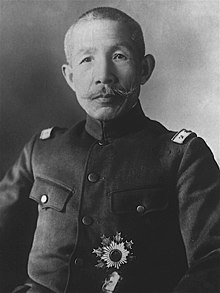Araki Sadao
Araki Sadao ( Japanese 荒木 貞 夫 ; * May 26, 1877 ; † November 2, 1966 ) was a Japanese officer and exerted great influence in Japanese politics in the 1930s . After completing his studies at the Army Officer School, he held the following positions, among others: Japanese military attaché in the Soviet Union , Commander of the Kempeitai , Head of Division 1 in the General Staff , Director of the Army Officer School and Commander of the 6th Division. In the cabinets of Inukai Tsuyoshi and Saitō Makoto he was Minister of the Army .
Araki was a passionate supporter of the imperial ideology. As such, he was at the head of the nationalist group Kōdō-ha , whose junior officers around Hashimoto Kingorō ( 橋本 欣 五郎 ) sought a military dictatorship in Japan. To this end, nationalist-minded groups and the Kōdōha sparked military-political incidents aimed at putting the Japanese government under pressure or removing it. The March incident of 1931, the October incident ( 十月 事件 ) of the same year, the May 15 incident ( 五 ・ 一 五 事件 ) of 1932 and finally the February incident of 1936 can be counted among these so-called incidents become. Araki was involved in these incidents - in 1931/32 Araki was Minister of the Army, in 1936 he was a military advisor - and had been chosen by the junior officers, in the event of a successful coup he would take over central power alongside Hayashi Senjūrō ( 林 銑 seiner ; at the time inspector general of training) and Masaki Jinzaburō ( 真 崎 甚 三郎 ; Deputy Chief of Staff at the time). After the failed coup attempt in February 1936, the army was purged of supporters of the ultra-nationalist Kōdōha. In this context, Araki was transferred to the reserve.
Araki Sadao was a resolute officer who, as a politician, strove for an authoritarian regime. In 1933 he had already advocated Japan's exit from the League of Nations , so as Minister of Education (from 1938) in the first cabinet of Konoe Fumimaro and later under Hiranuma Kiichirō he promoted militaristic politics and a militaristic education of the youth.
Because of his political activities, Araki Sadao, who was born in Tokyo in 1877, was promoted to general in 1933 and was ennobled to baron in the following year (1934), was indicted at the Tokyo War Crimes Tribunal and classified as a category A war criminal . He was sentenced to life imprisonment. He was in Sugamo Prison and was released early in 1955. He died in 1966.
literature
- Akao Fumio, Matsuda K., Yoshioka K. (Eds.): Nihonshijiten. Ôbunsha, Tokyo 2000/2001, p. 25.
- Hiratsuka Masao: Tôkyô Saiban. Kawade-Verlag, Tokyo 2002, p. 38.
Web links
- Newspaper article about Araki Sadao in the press kit of the 20th century of the ZBW - Leibniz Information Center for Economics .
| personal data | |
|---|---|
| SURNAME | Araki, Sadao |
| ALTERNATIVE NAMES | 荒木 貞 夫 (Japanese) |
| BRIEF DESCRIPTION | Japanese officer |
| DATE OF BIRTH | May 26, 1877 |
| DATE OF DEATH | 2nd November 1966 |
